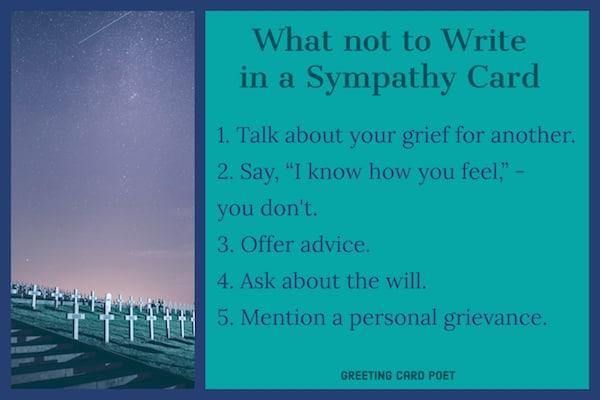Sympathy Card and Words of Condolence Writing Tips
One of the hardest things we ever have to do is figure out what to write in a sympathy card. There’s a finality about death that leaves even a professional writer at a loss for words.
How do you express sincere condolences without sounding maudlin or fawning? After all, it’s the loss of a loved one your reader has experienced, and you know that the reality is that nothing you say can change the facts or reduce their grief.
There are a few things to keep in mind when composing a note. Perhaps the most important thing to remember is the fact that no matter what you say, the fact that you took the time to say it will mean something to the recipient. If the old saw, “It’s the thought that counts,” means anything at all; it has the most meaning when writing a note or card.
The following is a brief guide to how to write a sympathy card that will bring the card reader some small measure of comfort in their time to grieve.
What to Say When Someone Dies?
If you know the recipient of your card personally, try to imagine you are talking to them face to face. Make a connection by referencing your relationship.
If you knew the deceased but not the recipient, be sure to let the reader know the connection you had to the departed. For instance, “We were college roommates who became life-long friends,” or “We were fellow interns at X Company for two years.”
A shared personal memory about the departed would be welcomed. Something touching or even humorous will be appreciated. Expressions of gratitude for knowing the departed will let the reader know that their loved one positively touched your life, and your acknowledgment of your loss will let the readers know that their grief is sincerely shared.
Here are a few Do’s and Don’ts when writing a sympathy card.
Do Include
- Make it personal.
- Keep it brief.
- Be sincere.
IF you can’t be at the service, remember that your card is the only chance you will have to comfort the bereaved. What would you say to them if you could be there? Picture yourself in the greeting line. It’s your turn to take their hand and look them in the eyes. You have only a few seconds to say what you feel. A well-written card can do this. It’s your chance to bring comfort, and that’s exactly what you want to do.
Try to convey how much the departed meant to you and how they touched your life. A good condolence card can be almost as good as a hug if you put effort into it, and it will be well worth the effort to the reader.
See Sincere Condolence Messages.

Don’t Include
Lament the circumstances of the death (they are well aware of it).
Rail against fate (it’s pointless).
Talk about your grief for another.
Say “I know how you feel,” you don’t.
Offer advice of any kind.
Ask about the will.
Mention a personal grievance of any kind.
Mention doctors or medicine.
You might like Grief Quotations and Memes.

A sympathy card is not the place to voice your opinion about death or the possibility of an afterlife. Try to keep in mind that the card is intended to bring comfort to the living. Keep your thoughts focused on the recipient, and try to avoid any personal opinions.
If you offer support, do be prepared to follow through. “If there’s anything you need, just call” is a hollow sentiment if you’re not prepared to back it up.
Don’t include your favorite quote from scripture or philosophy unless you are certain the reader shares your belief. A sympathy card is not the proper place to discuss metaphysics. You may be well aware of the deceased beliefs on the subject, but unless you are sure the reader shares the same beliefs, a card that preaches will not accomplish your intention of support and may even become a source of added anguish.
If you plan to attend the service, keep your card short and offer your condolences in person.
Can’t Attend Services
If you cannot attend the service, feel free to put your condolences in writing. Visualize yourself at the service, in the greeting line. What will you say when you are looking a mourner in the eye? Your card is your opportunity to do just that.
Please put some thought and feeling into it. Be genuine and sincere. Always remember that all grief is personal and that you are offering comfort and support. You can’t make the situation better, but you can let the recipient know that you are thinking of them and that you share at least some of their pain.
Further Reading — Words of Sympathy Messages
Words of Condolence
Sorry for your loss.
He will be missed.
Will be fondly remembered.
A large void in my heart.
Many good memories.
Bless to have had him/her for a friend.
Many acts of kindness.
Wonderful sense of humor.
A positive force.
A life well-lived.
Always thought of others.
Generous.
Kind.
Loving.
Wise.
The many people he/she touched.
Good works.
Loyal.
Loving.
Honest.
Genuine.
Warm.

Sympathy Words and Phrases to Avoid
Will live on.
In a better place.
Sacrifice.
Eternity.
Not fair.
Not right.
So unjust.
So wrong.
Unbelievable.
Senseless death.
Unfair.
Wrong.
Crazy.
Senseless.
Unbelievable.
Useless.
Medical.
Doctor.
Meet again.
Losing a Loved One
Death is one thing all humans have in common. We are all going to die, and we will also all experience the death of others. How to react to death is up to us.
If you want to offer true comfort to one who is grieving, make sure your words are genuinely heartfelt. Imagine the recipient is sitting in front of you. What you write should be just exactly what you would say in person.
If you make a promise, be prepared to keep it. Everyone says, “If you need anything, just call.” Be prepared to receive that call and make good on your promise. Chances are you will not get that call, but it is up to you to fulfill the pledge if you do.
The note or card sent when you cannot be at the service should be more specific than a card you send when you attend the service. Keep it personal and warm. Focus on your relationship with the survivor while honoring the life of the deceased. Remember, the card is for them, not the dead.
Try not to focus on their pain. You don’t share it. You can’t share it. Let them know you are there for them and tell them exactly how your life has been enriched through the friendship of the deceased.
Sharing good memories of yours will allow the recipient to know that their loved one really did touch your life and perhaps even bring a smile. This is true condolence, a reminder that their loved one lived and was loved.
What to write in a sympathy card meme

A Few Specific Circumstances
What to write in a sympathy card may differ based on your relationship with the deceased and the family. A note to a close friend should vary greatly from a note to a fellow worker or an acquaintance. When it comes to family, your duties go beyond a simple note.
Here are some specific situations and some suggestions to help you compose a note that will let the reader know that you are thinking of them in their honor of grief.
Close Friend
In this instance, you probably have some relationship with the departed’s family. A good memory, a funny story, or a personal tribute is a good solution. Be specific and include as much detail as you can. Share with the reader a bright moment in your relationship with their loved one.
By sharing good times, you will help the reader overcome their hard time, Death may be final, but good memories live forever. Share them.
Family Member
A card is a small part of your duty when a family member passes, but it is essential one is sent. In this instance, do not be afraid to share your most intimate feelings.
Even though you will be attending all services and even helping with logistics, the principal griever must have a written record of your condolences. Don’t be afraid to let your feelings show. Families that support each other during hard times are strong and resilient. This is your opportunity to add your strength to the family structure.
Co-Worker
A simple statement of condolences works effectively in the case of the death of a co-worker. It does not have to be an elaborate outpouring; a short, simple sentiment will be sufficient.
Expected Death
When a death through a long illness occurs, try not to dwell on the circumstances or say something like “in a better place” or “released from the pain.” Focus on the whole life of the departed rather than dwell on the last few months or years.
Unexpected Death
This is the hardest note to write, particularly in the case of the death of a child or young person. It is important in this instance to avoid statements about unfairness or tragedy in the case of unexpected death. Don’t rail against the unfairness of the universe. The family is doing enough of that on their own.
Here is where offers of support are significant. The grieving will need your support and will likely call upon it. Here is where you offer that support; be prepared to give it.
What to Write in a Sympathy Card Image

Summary
Writing a good, comforting note should not be a chore. Be honest and warm, and make yourself available. Offer support and be ready to give it. Celebrate the departed but remember, the card is for the living, and they should be the focus.
The most important thing to remember is “That while death is universal, grief is personal.”
By Hal Barnes
Hal is an author and writer based in Hudson, Wisconsin.
You’re on What to Write in a Sympathy Card.
You might like:
